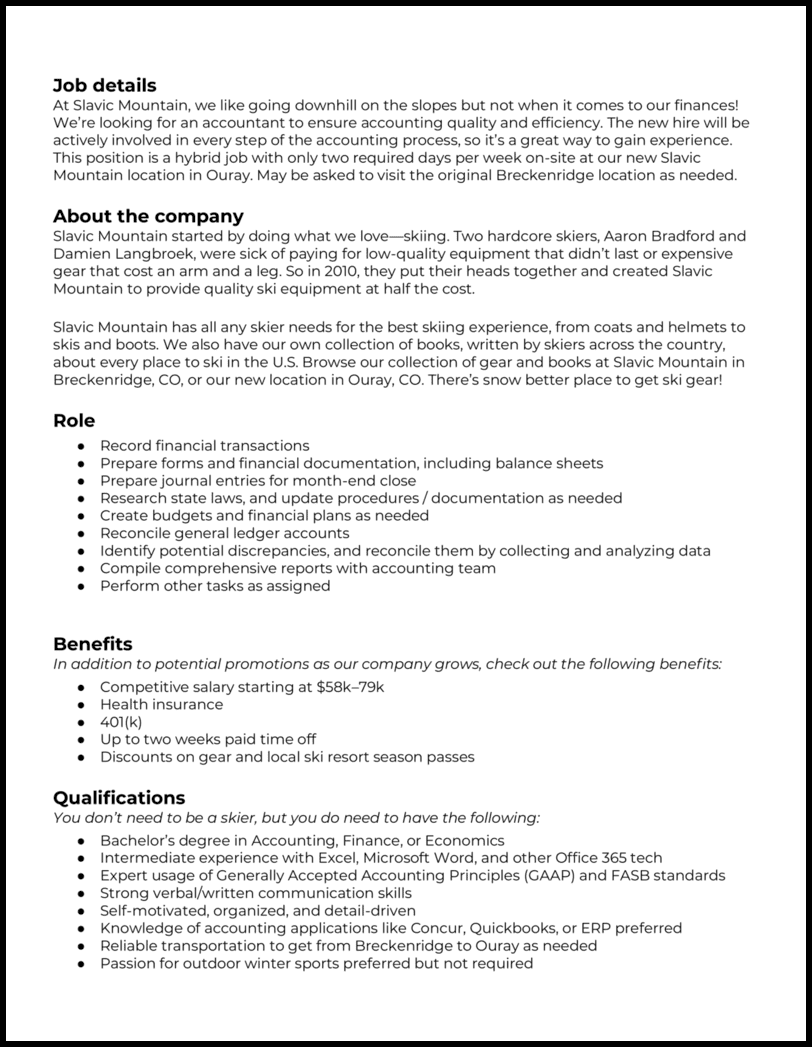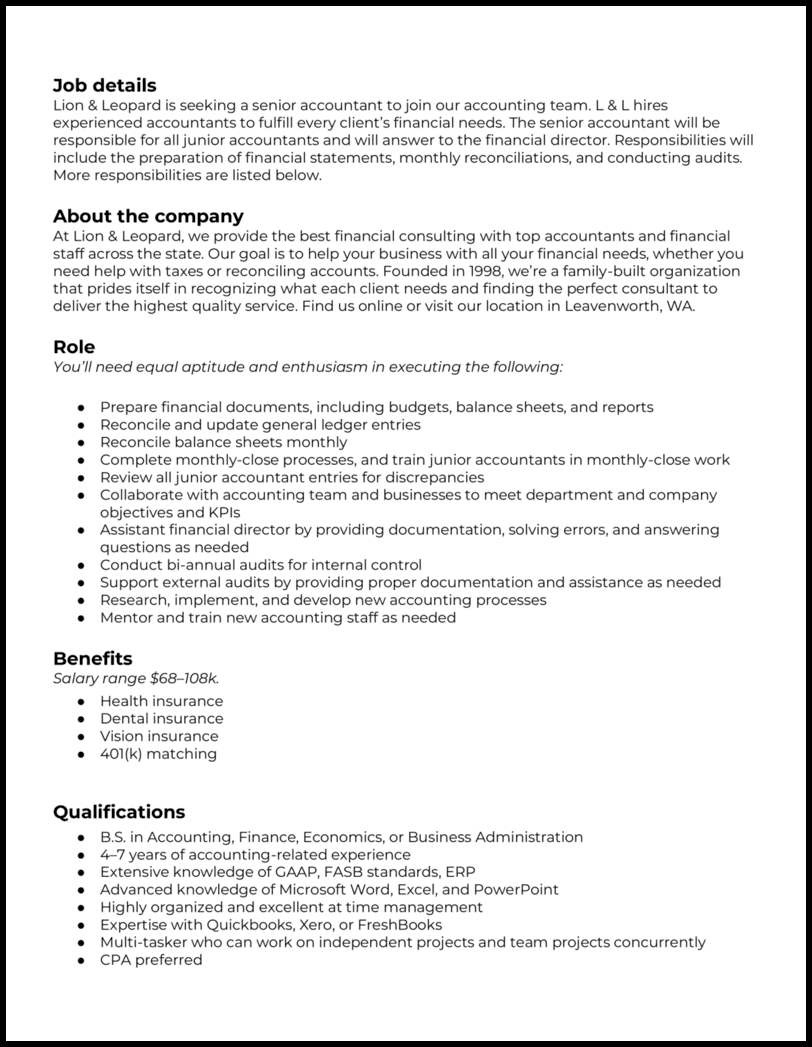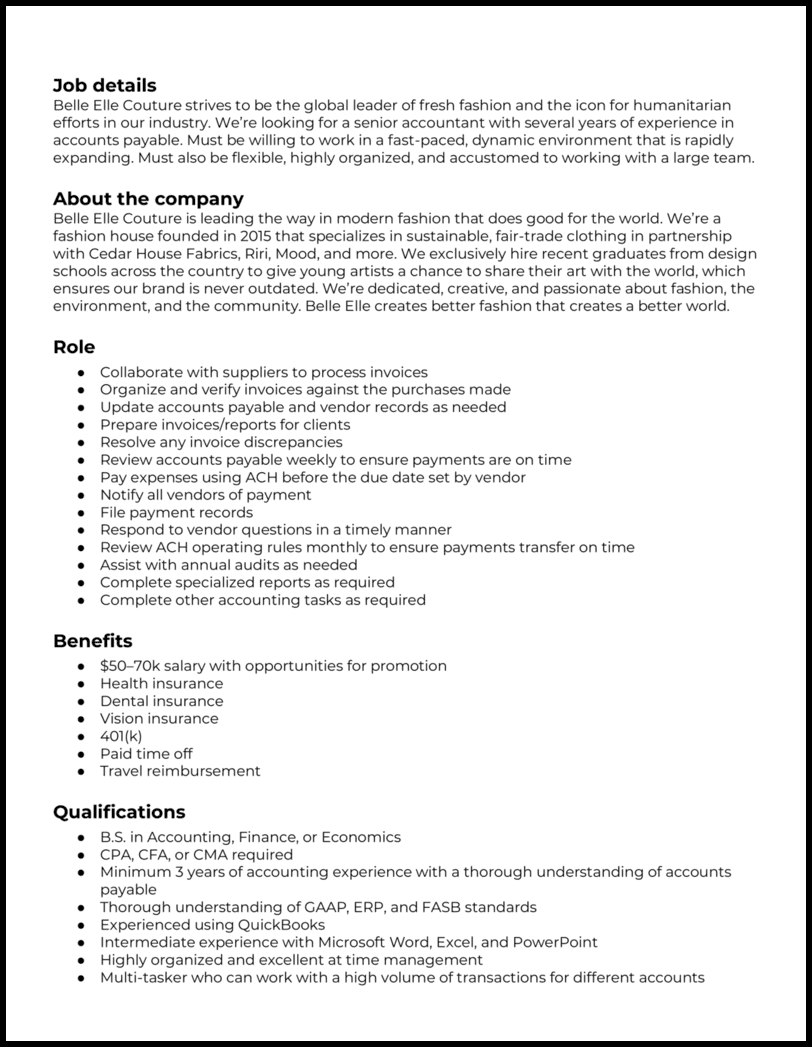Accounting is more complicated and rewarding than the public assumes. Some accountants don’t calculate numbers; instead, they might focus on solving financial crises, implementing procedures, and researching laws. The best accountants help companies plan, avoid pitfalls, and make solid financial decisions.
Accounting also requires a strong moral compass. According to the European Journal of Accounting, Auditing, and Finance Research, “Moral codes are the elemental principles that accounting professionals favor to abide by to boost their profession, maintain trust, and demonstrate honesty and fairness” (KaoDui 28).
Your job ad should remember this and deliver a realistic look at the role at your company. Our accountant job description examples and guide will help you write your best listing. Be on the lookout for some awesome accountant resumes.
Your Guide to Writing an Accountant Job Description

Job descriptions are the first interaction between a business and its future employees, so they should be personal, understandable, and detailed. Instead, most job descriptions are generic, confusing, and vague.
Accountants are driven people who can analyze data and solve problems. So, an accountant job description should cut to the point and highlight how the future hire will assist the company.
The description should also be enticing. Accountants are useful in a variety of sectors, so why should an applicant work at your company over the hundreds of others looking to hire? Organizations that go the extra mile with their job descriptions have a higher chance of finding and hiring their ideal employee.
Improving any kind of writing, including job descriptions, means making it more clear and more concise. The book Clear Writing and Literacy from the Ontario Literacy Coalition argues that clear writing focuses on what the reader needs to know, respects the reader’s background and intelligence, avoids dense text, and makes it easy for readers to find what’s important.
An article by the Nielsen Norman group explains that when writers stick to plain language, readers understand the meaning faster, it is more easily searchable, it makes the writer look smarter, and whatever was written can benefit everyone, from experts to English language learners.
Overall, when writing an accountant job description, keep it concise without being confusing, descriptive without being flowery, and engaging without being sentimental. Easier said than done, which is why we’re here to kindly nudge you in the right direction.
Outlining Your Accountant Job Description

Here’s a reliable outline that covers the bases:

Job details
This functions as the introduction. Who is your company, and what kind of accountant are they seeking? Why is it necessary or important that you add an accountant to your team? This is an excellent place to include more of your company’s personality, but remember to keep it brief. This tells readers who your company is looking for and why you’re hiring.

About the company
This section is often placed early. Accountants will need to know what kind of company they’ll work for to get the gist of the financial context. Are you a big organization with a big financial team or a small start-up? Make it clear who your company is and what you do.

What you’ll be doing
This section goes by many names and lists daily tasks. Most applicants view this section first, so make it easy to read. Accountants accomplish different tasks depending on each company and its financial team, so be specific about this new hire’s roles.
Some accounting tasks seem obvious, such as reconciling accounts, but include these points anyway for transparency. Use active verbs, be choosy with your words, and avoid too much jargon.

Qualifications
This section is one of the most important. Applicants need to know what’s required of them before they apply. Many won’t read this section word-by-word, though, so make sure this section is easy to read at a glance.
Also make sure you highlight the special qualifications your company requires—some only ask for a college degree and some experience, but is there anything else your company needs? Include any certifications, technology requirements, or specific tasks here.

Benefits
This section is the most flexible of all. It can go earlier or later, so long as it’s easily readable at a glance. Applicants want to know what they’ll gain from working with your company besides just getting a paycheck. Avoid generic terms like “great company culture” and include things like insurance, 401(k), etc.
Get the Right Attention on an Accounting Job Description

Most job descriptions are too generic, and the accounting candidate comes away having no concrete idea of the problems they’ll work on, who they’ll work with, or what kind of financial assistance the company needs. These kinds of job ads return the same type of accountant cover letters—generic and lacking purpose.
Customization is key; if you need an accountant who specializes in accounts payable, make that clear, as shown in the last job description sample. Make sure to devote one to two sentences to how this new hire will alleviate your company’s burdens.
Now, it’s time for the substance. If you’re hiring an experienced accountant, using acronyms like TB or PV is expected, but if the job is entry-level, stick to more generic accounting terms like GAAP and CPA, something that all entry-level accountants would know. Use plain language, and keep it simple.
Most stop after the previous step, but this is the time to make your post stand out. Revision is key to making your job description appealing. Cut filler and make everything easy to read.
Accountants are analytical and appreciate organization, details, and clear communication and shouldn’t have to read between the lines to figure out what you’re trying to say. Use bullet points and keep excess wordage to a minimum. If you cut so much that it sounds dry, focus on word choice instead of keeping excess.
Accountants shouldn’t have to read between the lines to figure out what you’re trying to say.
After all this, it’s a good idea to step away. When you proofread for the final time, you’ll need fresh eyes to see mistakes you missed. Having someone else give it a once-over is a good idea at this stage, too. Fix any grammar or syntax errors and misspelled/misused words (affect vs. effect, for example).
Remember, accountants are experts at finding mistakes, so make sure your job description is neat and tidy. Then, all that’s left is to post your job ad and wait for the perfect hire to apply.
The Many Hats of an Accountant

As you know well, accountants perform a variety of tasks that vary even more if they’re specialized. Every company has different financial needs, and every accountant has different roles.
Listed are some examples of different roles to include in an accountant job description. One accountant may not complete all these tasks, but they’re a good example of what the basics of accounting look like in a job ad.

Administration and bookkeeping
The primary role of an accountant is to gather, analyze, and interpret financial documents. This includes creating forms, preparing journal entries, and compiling reports. Keeping organized, up-to-date, and accurate reports is the heart and soul of accounting. While it’s not the most exciting job, this is an essential part of any company’s financial health.
- Prepare journal and general ledger entries, develop departmental reports, and reconcile accounts.
- This role will require intermediate experience with Microsoft Office Suite, strong organizational and analytical skills, and a keen eye for detail. Must also have experience with data collection, entry, and reporting.
- Accountants should have experience with accounting software like QuickBooks, Xero, or FreshBooks

Proofreader and fact-checker
One of the most crucial parts of an accountant’s job is ensuring all financial documents are updated and error-free. Every document must be accurate, coherent, and free of mathematical and grammatical errors. This role blends into the roles of administrator and researcher, but this role stands on its own because of the enormity of the task.
- Review and reconcile general ledger entries, journal entries, monthly balance sheets, and other financial documents for errors.
- This role will require attention to detail and excellent mathematical and written communication skills.

Researcher
Accountants must be ready to explain each financial decision made by the company and suggest future decisions based on current literature. Accountants conduct research frequently to stay on top of state laws, company procedures, tax laws, and more. If they do not comply with such laws, the company will face legal trouble, so this role is of major importance.
- Research local, state, and federal laws, review financial documents in accordance with such laws, and recommend modern practices for cost reduction, revenue enhancement, and profit maximization.
- This role will require keen attention to detail and strong time management and critical thinking skills. Pre-existing knowledge of state laws, GAAP, and FASB standards also required.

Troubleshooter
The best accountants are visionaries who can predict problems, suggest new financial practices, and craft solutions. They can see trouble long before it gets there and can answer questions about any issues that arise.
- Reconcile accounts, solve errors, and identify potential financial pitfalls.
- This role will require strong attention to detail, excellent problem-solving skills, and knowledge of GAAP and FASB standards.

Public communicator
Surprisingly to the public, accountants have to be excellent communicators. The best accountants know how to present their findings to management, associated departments, and clients in a professional manner, especially in times of financial distress. This role requires a leader to advocate for better practices and steer the company or client in a new direction.
- Collaborate with the financial department in a professional manner, gather financial information from relevant departments, and communicate findings to managers and clients as needed.
- This role will require excellent written and verbal communication skills and strict adherence to ethical guidelines.

Adviser
Many accountants work as consultants, aka advisers, to clients and companies, whether they’re part of a firm or working independently. They must know how to offer financial advice to a variety of clients and for whatever circumstances. Specialized accountants become advisers for niche areas, such as taxes, but all accountants must be able to suggest good financial practices to clients.
- Analyze financial documents, forecast potential risks, and advise upper management in best practices to reduce costs and build savings.
- This role will require strong verbal communication and critical thinking skills. Knowledge of state laws, GAAP, and FASB standards also required.

Technical process analyst
Modern technology has made the accounting process much easier, and accountants are expected to know how to use current accounting systems. Many are also expected to change processes that are outdated or inefficient, which requires knowledge of current technology and current accounting practices.
- Identify, recommend, and/or develop different accounting processes, and collaborate with associated staff in charge of platform operations, engineering, and architecture.
- Must have several years of experience as an accountant and extensive experience with Microsoft Office Suite, Intuit Pro Series, NetSuite, and familiarity with other revenue recognition software.








